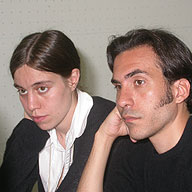An Interview with Ernesto Ardito, Virna Molina
The Moment a Film Is Born

Q: Why did you think of making this work?
VM: As a visual creator, I thought that it is extremely important to keep the unknown history of Argentina, and moreover our own roots, in people’s memories. Also, personally I had the feeling that these things weren’t being conveyed. In 2001, around the time when the country plunged into economic crisis, a movement to make political films started among the new generation. Since then Raymundo has had a symbolic presence as standard-bearer.
Q: What were you paying attention to during the editing?
EA: When talking about him somehow it always leans in the direction of his political proclamations advocating revolution. However, we wanted this work to render a humanistic portrait including how much affection gave his family, drawn from visuals, photographs and voice recordings left in various cases, as well as memoirs by his family and acquaintances.
Q: Which of his works are particularly wonderful?
EA: Los traidores (“The Traitors”) was a film made in secret, in violation of the law, at a time when oppression by the Argentine Anti-Communist Alliance and military dictatorship was harsh. Afterwards those involved with the film had to flee the country, and the others vanished. Even in that sense, it’s an incredible film. And there is also the film he is most remembered for, Me matan si no trabajo y si trabajo me matan (“They Kill Me If I Don’t Work and If I Work They Kill Me”). Even though ordinary workers are being filmed, there is absolutely no feeling of hesitation or characteristic overzealousness. It feels like the viewers are hearing the story directly, as if perhaps the camera isn’t there at all.
Q: There are many images of him in the process of making films, but did that have an impact on you?
EA: He uses film as a place for workers themselves to express the tragic reality in which they are situated. He recognized the moment film is born of the people as a tool for changing actual society, not just as a pre-existing thing that has one-sided impact, and he lets you feel that vast potential.
Q: As they laughed together at the comically depicted authorities, the workers viewing his films probably gained the hope of possessing the strength to fight back.
EA: Films dealing with politics really tend to be boring, but actually they shouldn’t be like that, and we really paid attention to this. After all, if the message doesn’t get across, it’s pointless.
VM: Some people think that politics are politics, and so there’s no choice but to sacrifice the humanistic aspects of the story, but I think that holding political convictions and living in a humanistic way should actually correspond. Two of the criminals at the end of the film got light sentences and were released. That’s because they were backed by the financial world, and the government ended up going along with the deal, especially at a time when the country was in serious straits and politics couldn’t be separated from economics. And that backing comes from people who in the past were on the same side with the oppressors.
Q: What about your next project?
EA: A ceramics factory in Patagonia closed down, and usually that would be the end, but the workers started managing the factory themselves. They went from an existence where they just did the work they were told to do, and once they started using the equipment that previously only specialized technicians could use, they did everything themselves, including the work of running the factory. The previous people came to take away the equipment, but the villagers are on the side of the workers and won’t let anyone else in. It’s about the battles of a new generation.
VM: This film looked anew at the present through studying the past, and the next work will look at the present, and I’d like it to be a work that connects with the future.
Note: For editorial purposes, some comments by the two directors have been summarized in the words of one person.
(Compiled by Tanaka Rio)
Interviewers: Tanaka Rio, Yokota Yuri / Interpreter: Hoshino Yayoi
Photography: Yokota Yuri / Video: Oki Masaharu / 2003-10-12
